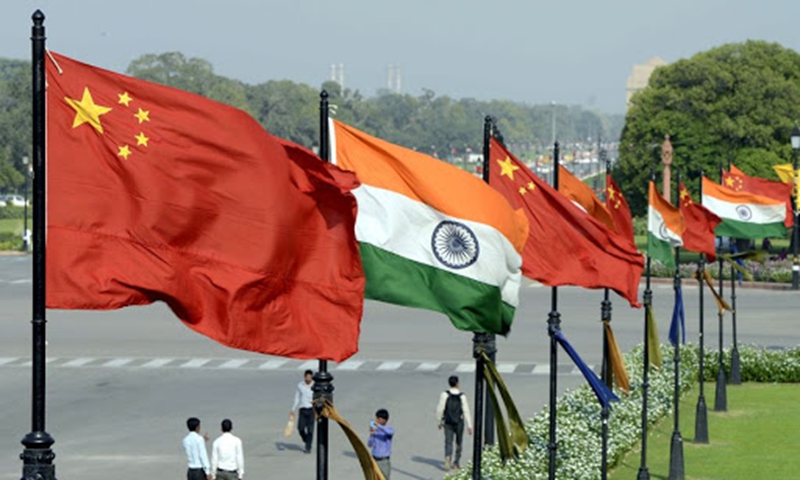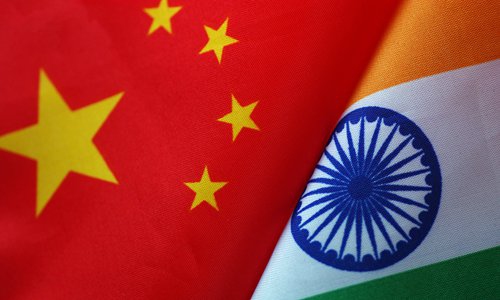India keeps hyping Sinophobia, Modi govt shows no intention to fix ties with China: experts

China-India
Although China-India border tensions have eased somewhat as the two sides are seeking a solution through negotiations, the anti-China sentiment and related actions within India have not eased but keep simmering with more biased and hostile voices from some Indian scholars and Indian journalists, proving that New Delhi has no intention to control such a dangerous atmosphere and fix bilateral ties, Chinese experts said on Tuesday.
The latest move made by the Indian government is "informally telling airlines not to fly Chinese nationals into the country" as "a retaliation" for China's decision to refuse the entry of some Indian nationals into China for epidemic prevention, according to reports from some Indian media outlets on Monday. Unfortunately, such a hostile move of New Delhi against China's reasonable decision was praised by many nationalist Indian web users on social media networks.
It's not only nationalist web users who have been voicing aggressive comments online, some Indian politicians, scholars, journalists, NGO activists and religious figures are also embracing the sentiment of Sinopobia, pushing such sentiment into real action in order to harm China-India ties.
Chinese analysts said anti-China sentiment or Sinophobia is "political correctness" in India at the moment, and the Indian government has no intention to control it but continues to use it to cover up their failed handling of COVID-19 epidemic situation and poor economic performance this year. In the short term, there is no hope of fixing bilateral ties, they said.
Offend China, please the US?
Brahma Chellaney, a scholar on geopolitics at the New Delhi-based Center for Policy Research, is a representative among Indian scholars who holds extreme hostile views against China. For instance, he has groundlessly accused China's hydropower project on the Yarlung Zangbo River of using data for a "water war against India." He also wrote articles for international media to hype up China threats, accusing China of "exporting" COVID-19 and wooing countries to follow the US' containment of China.
There are many scholars or former officials in India who benefit from hyping up anti-China sentiment or the "China threat theory", said Chinese experts, such as Chellaney, former Indian ambassador to China Vijay Gokhale and defense commentator C Raja Mohan, because smearing China or labeling China an enemy will get applause from the US and it serves the interests of Narendra Modi's government, said Chinese experts.
Qian Feng, director of the research department at the National Strategy Institute at Tsinghua University, said that Indian researchers or commentators' incitement of anti-China sentiment have reached fever pitch in 2020.
"The indulgence of the Indian government is behind this anti-China fever pitch with some officials continuing to lash at China to distract domestic attention away from the horrible epidemic situation and sluggish economic performance," Qian told the Global Times. Another reason is the ongoing talks on border issues have been followed with several stand-offs along the border.
Lin Minwang, a professor with the Institute of International Studies at Fudan University, told the Global Times that India's anti-China "political correctness" renders Indian scholars who hold friendly or at least objective views on China very difficult to speak out because praising China or even saying something to balance the extreme anti-China sentiment will bring them trouble and criticism for being non-patriotic.
"Sometimes, Indian scholars are forced to prepare 'two faces' as they would speak positively when talking to Chinese colleagues, but badly smear and accuse China to win applause when conducting exchanges with US scholars or officials," Lin said.
However, to what extent Indian scholars and politicians can still please the US in the future remains a profound question, because US President-elect Joe Biden is likely to abandon or at least adjust its so-called "Indo-Pacific strategy" made by Donald Trump's administration, Chinese experts said.
In order to curry favor from the Trump administration, the Modi government have done much to offend China, even making Russia unhappy as it moves too close to the US. Once the US adjusts its strategy and shifts US input away from Asia to Europe, or even starts to fix ties with China, those Indian politicians and scholars who are being extremely hostile toward China now will get headaches, said Lin, noting "that's why they are panicking and asking more countries to team up with them to contain China."

China-India
No intention to fix ties
Hatred in India against China is multidimensional, not only originating just from geopolitical conflicts, but also the COIVD-19 pandemic, affairs related to India's neighbors like Nepal and Pakistan, as well as China's normal business activities in the country.
Since June, a political and cultural organization Swadeshi Jagran Manch (SJM) began to call on the Indian government and citizens to boycott Chinese products as a "tribute" to Indian soldiers that died in a clash with Chinese troops in the Galwan Valley.
Manch co-convener Ashwani Mahajan told IANS that he is appealing to Indian actors, sportspeople and other celebrities not to promote Chinese products. In an interview with Indian media, Mahajan said that the organization demanded the WHO to rename COVID-19 as the "China virus."
Qian noted these moves would erode the foundation of mutual trust between China and India and "hurt people-to-people and trade exchanges, setting up hurdles for solving border issues."
When the China-India border tension escalated in June and the Indian government launched boycott campaigns against Chinese products and apps earlier this year, Global Times reporters tried to reach some Indian scholars who disagree with the radical, risky and nationalist practices in the country to share their opinions, but they declined to comment, fearing they could be harassed by anti-China nationalists and face potential isolation in academic circles.
When the Modi administration wants to improve China-India ties, New Delhi will make efforts to contain anti-China forces or Tibetan separatists within the country to pave a way for visits by Chinese national leaders and further cooperation, but apparently now, the Modi administration has no intentions of fixing ties with China, Lin noted.
"What the Indian government is doing now shows it's immature," and "compared with China, a mature and responsible country, India needs more time to grow up," Qian said.
Too weak to get attention?
After the border tensions were eased before winter and the two sides seek solutions to the issue through negotiation, coverage of India among Chinese media outlets is reducing, meaning China does not want to hype up anti-India sentiment to retaliate against what India does to China.
According to a survey conducted by the Global Times poll center from December 11 to 17, collecting 1,945 questionnaires from respondents aged 18-69 from 16 major Chinese cities across the country, only 6.7 percent of respondents chose India as the country they deemed as most influential in terms of bilateral relations for China.
Li Haidong, a professor at the Institute of International Relations of the China Foreign Affairs University, told the Global Times that while a provocative India has been covered more in Chinese media, the Chinese people maintain a rational view on it. "To some Chinese, the importance of the relationship with India is less than ties with Southeast Asian countries."
Lin said that "India's negative perception towards China originates from its fear of China's strength. Indian media, scholars and society have paid much more attention on China than what we have paid to them. This is due to the gap in national strength between the two countries. China is much more powerful than India, which is a hard fact."
The Indian government is overly turning economic issue into security issue, as they have abandoned an opportunity to use China to assist with their own development though they might believe that this is not important compared to using anti-China sentiment to cover up their poor domestic governance, Lin said.



